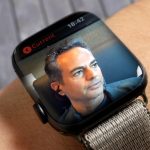Our research enables novel health monitoring and human performance optimization applications leveraging wearables and new body sensing technologies.
Quick Links:
Societal Impact
Publications
People
With the advancement and pervasiveness of wearable sensors (like the Apple Watch and Fitbit – among many others), it is now possible to continuously collect health-related data from individuals. This data can be complemented with mobility assessments provided by versatile mobility sensors (e.g., Microsoft Kinect). As a result, there is an unprecedented opportunity to augment traditional health and human performance assessments with these rich longitudinal datasets. IMSC supports efforts in this space by collecting, integrating, analyzing and modeling multidimensional health and mobility data in support of multidisciplinary research aimed at improving health and human performance.
In the past, we have taken part in a number of health-related studies. Most recently, in collaborations with the Keck School of Medicine of USC, USC Norris Comprehensive Cancer Center, MD Anderson Cancer Center and Los Angeles County Hospitals, we helped collect, store, and analyze clinical data, Microsoft Band and Kinect data, as well as patient reported outcomes from 60 patients undergoing highly emetogenic chemotherapy for solid tumors. This project, the Analytical Technologies to Objectively Measure Human Performance (ATOM-HP) project, was a formal recommendation and contribution by the Department of Defense (DoD) to the Vice President Cancer Moonshot Initiative to examine how Technology can be used to bridge the gap between doctor’s visits.

Additionally, in collaboration with Alfred E. Mann Institute for Biomedical Engineering, we have used Microsoft Kinect data to monitor and evaluate Parkinson’s Disease Patient performance in the Point of Care Mobility Monitoring (PoCM) project. With PoCM, we showed that it was possible to differentiate the medication state by analyzing the skeleton data that the Kinect produces.

Some other notable current projects in collaboration with the Department of Surgery of Keck School of Medicine of USC include:
Analysis of Medical Data from Electronic Medical Records (EHR) and Electronic Health Records (EMR)
Prediction of Success and Survival Score in Liver Transplantation
Liver transplantation is a lifesaving procedure for those suffering from end-stage cirrhosis, liver failure, or a cancerous lesion of the liver. Unfortunately, there is a shortage of available liver grafts. Approximately 14,000 patients are listed and waiting for orthotopic liver transplantation (OLT) while only 7,000 OLTs are performed annually. Our goal is to predict the Success & Survival Rate among Liver Transplant patients. The result could help on both ends (patient and doctor) wherein the patient can be ensured a longer survival rate and give a second opinion to the doctor about the amount of risk involved throughout the surgery.
Anemic Status Prediction
Anemia and clinical symptoms are currently used to determine whether a packed red blood cell transfusion is necessary. With this research we aim at predicting postoperative anemia to help inform medical practitioners whether there is a need for further packed red blood cell transfusion.
Societal Impact

Selected Publications
Minh N.B. Nguyen, Zaki Hasnain, Sanjay Purushotham, Luciano Nocera, Paul K. Newton, and Cyrus Shahabi, Mining Human Mobility to Quantify Performance Status, The 17th IEEE International Conference on Data Mining (ICDM2017) (demonstration), New Orleans, LA, USA, November 18-21, 2017.
H. Y. Ching, M. Bhatnagar, R. Hogen, D. Mao, A. Farzindar and K. Dhanireddy, “Anemic Status Prediction using Multi Layer Perceptron Neural Network Model,” in proceeding of Global Conference on Artificial Intelligence, Miami, Florida, US, 2017.
Jiun-Yu Kao, Minh Nguyen, Luciano Nocera, Cyrus Shahabi, Antonio Ortega, Carolee Winstein, Ibrahim Sorkhoh, Yu-chen Chung, Yi-an Chen, and Helen Bacon, Validation of Automated Mobility Assessment using a Single 3D Sensor, ACVR2016-Fourth International Workshop on Assistive Computer Vision and Robotics in conjunction with ECCV2016, Amsterdam, The Netherlands, October 9th, 2016.
Banaei-Kashani F, Medioni G, Nguyen K, et al. PoCM2: Monitoring Mobility Disorders At Home Using 3D Visual Sensors and Mobile Sensors. In: Wireless Health; Baltimore, MD; 2013.
People
Faculty
Kiran K. Dhanireddy MD (Keck School of Medicine of USC, Department of Surgery)
Peter Kuhn (USC Dana and David Dornsife College of Letters, Arts and Sciences)
Jorge Nieva (Keck Medical School of Medicine of USC)
Antonio Ortega (USC Viterbi School of Engineering, Department of Electrical Engineering)
Beth Smith (USC Division of Biokinesiology and Physical Therapy)
Cyrus Shahabi (USC Viterbi School of Engineering, Department of Computer Science)
Carolee J. Winstein (USC Division of Biokinesiology and Physical Therapy)
IMSC Research Staff
Anna Farzindar
Luciano Nocera
Erick Moen
Students
Saeed Abrishami (Research Assistant)
Kien Nguyen (Research Assistant)
Minh Nguyen (Research Assistant)
Tanachat Nilanon (Research Assistant)
Arpit Bhardwaj (Directed Research)
Zheng Xin Chai (Directed Research)
Karthik Rajendran (Directed Research)
Current Undergraduate Students
Ashwin Bhumbla
Tyler LaBonte
Jack Lulich
Roopal Kondepudi
Notable Alumni
Farnoush Banaei-Kashani (Assistant Professor at the University of Colorado, Denver)
Liyue Fan (Assistant Professor at the SUNY Albany)
Houtan Shirani-Mehr (Apple)
Hyunjin Yoon (Electronics and Telecommunications Research Institute (ETRI))
Kiyoung Yang (Microsoft)
Former Undergraduate Students
Lorraine Sposto (NASA JPL)








